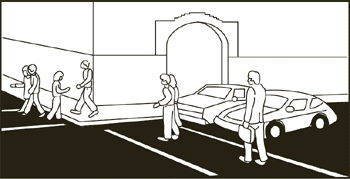It is the motorist's responsibility to do everything possible to avoid colliding with pedestrians. Bicyclists, skaters and skateboarders in a crosswalk or driveway are considered pedestrians. Turning motorists must stop for pedestrians at intersections and driveways, even when the crosswalk is not marked, as these are also legal crosswalks. Motorists must stop or yield as appropriate for pedestrians crossing the street or driveway at any marked mid-block crossing, driveway or intersection without traffic signals.

The primary traveling aids for a person who is blind are often a white cane or a trained guide dog. Independent travel involves some risk that can be greatly reduced when you, the driver, are aware of the use and meaning of a white cane or guide dog.
Drivers must always yield the right-of-way to persons who are blind. When a pedestrian is crossing a street or highway guided by a dog or carrying a white cane (or a white cane with a red tip), vehicles must come to a complete stop.
Drivers must yield the right-of-way to mobility-impaired persons and pedestrians utilizing the assistance of a guide dog or service animal. When a pedestrian is crossing a public street or highway and the pedestrian is using a walker, a crutch, or an orthopedic cane or wheelchair, vehicles must come to a complete stop.
Take your Florida Drug and Alcohol Course online with DriverLicenseSchool.com! Sign up by clicking the "GO" button below.
Take your Florida Learners License Test online with DriverLicenseSchool.com! Sign up by clicking the "GO" button below.